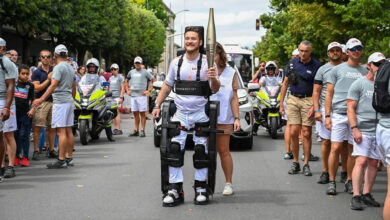Attorney General of the International Criminal Court Responds: Will Putin Be Tried?

We are seeing a violent escalation in the war in Ukraine, with the targeting of civilians and civilian areas. There is a rising cry for international justice against both the war crimes committed in Ukraine and deterrence.
Karim Khan, Chief Prosecutor of the International Criminal Court, was a guest of Euronews in The Hague; He answered his questions about the developments in Ukraine.
Euronews: Mr. Attorney General, the United Nations Human Rights Committee, which examined nearly 30 towns in Buça, found evidence of rape and executions, from a 4-year-old child to an 80-year-old adult. What is the role of the International Criminal Court in the prosecution of these serious crimes?
Karim Khan, Chief Prosecutor of the International Criminal Court: “The role of the Prosecutor’s Office is to make sure that there is no escape from accountability, impunity, that anything can be done, that when a crime is committed there will be no consequences. This requires us to be on the ground. then it requires having resilience, using court processes to bring cases to independent judges’ review. That is, if we are convinced that a crime has been committed.”
Euronews: We’ve seen Ukraine try some people in its own national courts. But I guess the real question is: When will we see the generals, soldiers and military personnel responsible for these crimes in the courtroom?
Karim Khan, Chief Prosecutor of the International Criminal Court: “This is a function of evidence. Before I was elected and when I took office in June last year, I said that we have a responsibility to show that international justice is not just a theoretical construct. Victims, those most in need of the law, the most vulnerable, children, women, “This is how men are felt by civilians who have suffered greatly, not only in Ukraine but in many parts of the world. I am conscious of the fact that international justice cannot be seen as a historical practice investigating past claims of historical interest.”
‘We have the right to judge political and military decision makers under the Rome Statute’
Euronews: Do you envision a court here in The Hague to complement Ukraine’s national court system? Is that how something is called, as we saw in Yugoslavia and Rwanda?
Karim Khan, Chief Prosecutor of the International Criminal Court: “You are absolutely right, the principle of complementarity is a fundamental principle. We have had a very good cooperation with the authorities in Ukraine in this regard. We work very closely with them. We conduct our investigations independently because we have a certain judicial structure that Ukraine does not have. We have provisions on genocide, war crimes and crimes against humanity. We have the capacity to charge not only direct perpetrators, alleged rapists, murderers or bombers, but also their military and political superiors. We have as a legal instrument under this Rome Statute if a right and evidence requires it, we use it.”
Euronews: You mentioned that this has echoes of Nuremberg. You said that at the United Nations. So you mean, for example, that Russian President Vladimir Putin could find himself at the war crimes tribunal in The Hague?
Karim Khan, Chief Prosecutor of the International Criminal Court: “One thing has been clear since Nuremberg that neither orders from superiors are a defense nor a person’s official position as a general, president or prime minister is a justification for immunity. An international court order by the Security Council The International Criminal Court, known as the International Criminal Court and used by the Security Council in Sudan, Libya and other cases, has the power to try any person within its jurisdiction who commits a crime, fails to punish or prevents it.

‘There is no immunity for international crimes’
Euronews: Does this also mean that if there is a negotiated solution or a peace agreement between Ukraine and Russia, they will gain immunity?
Karim Khan, Chief Prosecutor of the International Criminal Court: “There is no immunity for international crimes. And as you know, it is one of the Nuremberg principles that there is no statute of limitations for war crimes or crimes against humanity. ‘Hostis humani generis’ is a safe haven for crimes against humanity, crimes that violate the fundamental principles of humanity. and the law has a function, and we will do our part.”
Euronews: Many lawyers say that this is a “genocide ideology” based on the rhetoric heard from Russia, Russian generals and others. Based on your own evidence, what you personally see, do you think this is something that needs investigation?
Karim Khan, Chief Prosecutor of the International Criminal Court: “We are in a very critical time when leaders are talking about violence, bombs, using bullets. It’s time to take a break and think about where we are going. But the minute we talk about tactical nuclear weapons, it shows that we are on the eve of a nightmare, not just a time of uncertainty. We have to take this very seriously. I think the law has a role to play. It’s not a Hollywood movie. It’s not a theater play. It’s something that’s very close to most people. And now Ukrainians are leaving their homes, separated from loved ones, and scattering all over Europe. “Like my team members in a bunker in Kiev, they are thinking about when the next missile will hit. These civilians deserve every protection.”
‘International Criminal Court can issue a search warrant in Russia or Ukraine’
Euronews: How will the process work if there is evidence of violations of the Geneva Convention by certain individuals? Is there a stage where these people can be arrested on the territory of Ukraine or Russia?
Karim Khan, Chief Prosecutor of the International Criminal Court: “I won’t go into specific scenarios, but if after the investigations I decide there is grounds to believe a person is guilty, I can issue a search warrant. We’ve seen this in the former Yugoslavia, in Rwanda, at the International Criminal Tribunal, and it’s well known. “The judges decide whether the conditions are met. And then we get to the stage where we look at the possibilities of arrest options. Or people surrender. There were heads of state who voluntarily surrendered before the trial.”
Euronews: My last question. We saw the bombing of the Kerch Bridge in the occupied Crimea. Given that we are at war and this is an occupied territory, was that a legitimate military target for you as a lawyer?
Karim Khan, Chief Prosecutor of the International Criminal Court: “I’m not going to comment on this because I don’t even know what really happened. I’ve read multiple scenarios in the press that it could be an accident, sabotage or anything. I will not comment on whether it is a crime, whether the target is legitimate. One thing is for sure, you cannot intentionally target civilian objects, schools and hospitals, civilian residences, unless they are used to gain a significant military advantage. They are used for military advantage. Even in this case, there is the rule of proportionality. It’s a viable thing. And of course you can infer from that in terms of various different targets, like bridges or energy centers. But the spread of terrorism is not allowed.”






